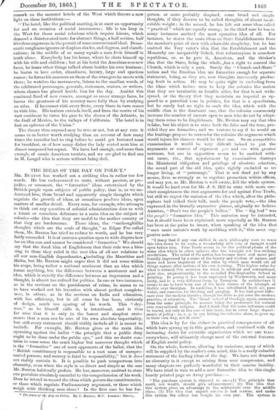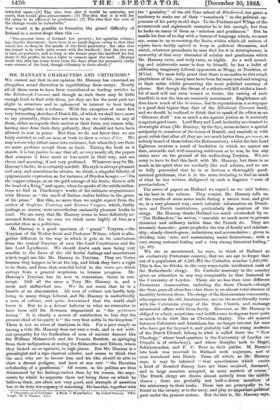THE IDEAS OF THE DAY ON POLICY.*
MR. Bux.rox has worked out a striking idea in rather too few words. He has endeavoured to state, without passion, or pre- judice, or comment, the " formative" ideas entertained by the British people upon subjects of public policy, that is, as we un- derstand him, those broad and apparently simple thoughts which regulate the growth of ideas, or sometimes produce ideas, upon matters of smaller detail. Every man, for example, who attempts to think out any question of colonial administration does so with a latent or conscious deference to a main idea on the subject of colonies—the idea that they are useful to the mother country or that they are burdensome. These ideas, the unthoughtlike thoughts which are the souls of thought," as Edgar Poe called them, Mr. Buxton has tried to reduce to words, and he has very fairly succeeded. It is of course a question open to wide dispute how far an idea can and cannot be considered "formative." We should say that the fixed idea of Englishmen that their rule was a bles- sing to those they ruled is the root idea of all our relations to all our non-English (dependencies, 4including the Mauritius and Malta, but Mr. Buxton might argue that it did not come within his scope, being rather a national sentiment than an idea which forms anything, but the difference between a sentiment and an idea, which is exactly the difference between an impression and a thought, is almost too refined for politics. In one or two instances, as in the sections on the punishment of crime, he seems to us to have worked out his intention with almost perfect complete- ness, in others, as in the sections on India and education, with less efficiency, but in all cases he has been, obviously of design, much too sparing of his words. This " dry- ness," as he himself calls it, is intentional, and is thus far wise that it is only in the barest and simplest state- ments that a man can be sure of his own absolute impartiality, but still every statement should visibly include all it is meant to include. For example, Mr. Buxton gives as the main idea operating against the ballot " the principle that a public duty ought to be done under the public eye," and this no doubt con- tains in some sense the much higher but narrower thought which is the "formative" one of most opponents of the ballot, that the " British constituency is responsible to a vast mass of unrepre- sented persons, and secrecy is fatal to responsibility," but it does not visibly contain it. It is possible to push compactness into obscurity, even when the style is so direct and simple as the one Mr. Buxton habitually prefers. He has, moreover, omitted to state
one postulate absolutely essential to the comprehension of his work. Does he intend to record the ideas which govern the constituencies, or those which regulate Parliamentary argument, or those which weigh with thinking men alone ? In the first case he has for-
* The Ideas of le Day on Policy. By C. Batton, M. P. London: Murray. gotten, or more probably despised, some broad and simple thoughts, if they deserve to be called thoughts, of almost incal- culable weight ; in the second, he has left out some ideas called " practical " which are equally strong ; in the third case lie has in many instances omitted the most operative idea of all. For instance, he states the main ideas on State Establishments from the member's point of view with admirable simplicity, but he has omitted the Tory voter's idea that the Establishment and the Monarchy are inseparably linked, that voluntaryism is somehow republican, or, as he puts it, American, and the thinker's idea that the State, being the whole, .has a right to control the Church, which is only a part. Surely the " Church-and-State" notion and the Erastian idea are formative enough for separate statement, being, as they are, root thoughts incessantly produc- ing fruit in action. Ile may be quite right in excluding from the ideas which induce men to keep the colonies the notion that they are invaluable as humble allies, for that is not wide- spread, or the theory that they maintain an imperial as op- posed to a parochial tone in politics, for that is a speculation, but he surely had no right to omit the idea, which with the middle class is the dominant one, that the colonies enormously increase the number of careers open to men who do not by adopt- ing them cease to be Englishmen. Mr. Buxton may say that idea is false, but his object is to state both the false and the true, pro- vided they are formative, and we venture to say if he would on the hustings propose to surrender the colonies the argument which would injure his chances would be that one. So on competitive examination it would be very difficult indeed to put the arguments or sources of argument pro and con with greater neatness, but one in opposition seems to be omitted with- out cause, viz., that appointment by examination destroys the Ministerial obligation and privilege of absolute selection, the sound part of the old idea, quite rightly excluded as no longer living, of " patronage." That is not dead yet by any means, lives so strongly as to regulate promotion within offices, and may yet, as Mr. Buxton is well aware, kill the whole system. It would be hard even for Mr. J. S. Mill to state with more suc- cinct completeness the root arguments for and against Free Trade, but still we regret the omission of the idea which, after the philo- sophers had talked their talk, made the people vote,—tho idea expressed in the brutally expressive phrase, originally we believe
Austrian, "Don't tax the people's bellies." The " big loaf " was the people's "formative idea." This omission may be intended,
but it should have been explained, more especially as Mr. Buxton has been at the pains to insert, when speaking of the idea that " man mars nature's work by meddling with it," this most sug- gestive note :— "I fancy that if any one skilled in such philosophy were to trace this idea down to its roots, a wonderfully rich vein of thought would open before him. Free Trade seems to be the political phasis of the same idea which in other spheres also has wrought not less striking revolutions. The mind of the nation has become more and more pro- foundly impressed by a sense of the beauty and wisdom of nature, and more and more impatient of the rules by which man would cut all things square, after notions of his own devising. This higher value for what is natural, this aversion for what is artificial and conventional, gave rise, unquestionably, to the so-called Pre-Raphaelite School in painting. In poetry it has been expressed by Wordsworth, and more lately, and in a very different form, by Tennyson. In architecture it seems to me to have been one of the main causes of the triumph of, Gothic over Georg,ian. In medicine, it has substituted fresh air, pure water, and exercise, for bleeding and purging. It has had great influ- ence over the modern theories, though too little as yet over the modern practice, of education. The broad' school of theology, again, emanates from the same principle, its essence being the preference for natural over conventional religion. And I think that the same influence could be traced, not only in the case of free trade, but in other large depart- ments of policy : as, e. g., in our lotting the colonies alone, to grow up in their own way, not in ours."
This idea is by far the richest in practical consequences of all which have sprung up in this generation, and combined with the increasing desire for scientific organization which we can trace everywhere, will ultimately change most of the external features of English social policy.
On the whole, however, allowing for omissions, many of which will be supplied by the reader's own mind, this is a really valuable statement of the leading ideas of the day. We have not detected an obscurity in it except as arising from over compression, and many chapters are perfectly wonderful in their concise lucidity. We have tried in vain to add a new formative idea to this single loosely printed page on Army purchase :—
" The purchase system is objected to on—(l) The principle that merit, not wealth, should give advancement ; (2) The idea that this system gives an advantage to the aristocratic over the middle class; (3) The idea that unpaid service is bad service, and under this system the officer has bought his own pay. The system is defended upon—(1) The idea that else it would be seniority, not merit, that would give advancement ; (2) The, idea that it is well for the army to be officered by gentlemen ; (3) The idea that the cost of the change would be unbearable."
Nor would it be possible to formulize the grand difficulty of Ireland in a neater shape than this :-
"The present state of Ireland: her poverty ; her agrarian crimes ; her chronic discontent ; have been in no small degree owing to that idea which lies so deep in the minds of the Irish peasantry : the idea that the tenant is in truth joint owner with the landlord; that the two are, in fact, co-partners, and so long as the tenant pays the landlord his fair share of the profits, he has a right to remain upon the land. (Beyond doubt this idea has come down from the days when the peasantry really were owners of the land, though tributary to their chiefs.)"































 Previous page
Previous page